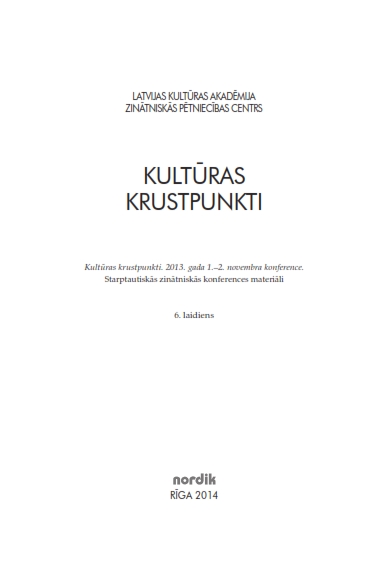Kultūras kanons kā kultūrpolitikas programma: tā attīstības politiski ideoloģiskie priekšnosacījumi un perspektīvas
Cultural Canon as a Cultural Policy Programme: Political and Ideological Preconditions and Perspectives of its Development
Author(s): Anda Laķe, Juris GoldmanisSubject(s): Governance, Politics and society, Social development, Nationalism Studies, Sociology of Culture, Sociology of Politics
Published by: Latvijas Kultūras akadēmija
Keywords: cultural canon; preconditions for sustainability of the cultural canon; political ideology; nationalism; multiculturalism;
Summary/Abstract: This article provides a comparative analysis of the initiative of cultural policy implemented in three countries of the European Union (the Netherlands, Denmark and Latvia) and the term “cultural canon” that is used to characterise it. As the substantiation, objectives, functions and results of the cultural canon as a state-financed programme of cultural policy essentially differ in all the above countries, there is a ground for discussions about the preconditions for the sustainable development of this programme. The main objective of this article is to reveal the significance of political and ideological factors of the cultural canon in the development of cultural policy and the choice of scenarios in the future. In order to reach this objective, the theoretical understanding of the notion “cultural canon” has been analysed and its link with the values of a certain political ideology. A comparative analysis and assessment of the development of cultural canons in the Netherlands, Denmark and Latvia have been carried out by applying data of empirical research that is based on qualitative methodology. The article explores the development scenarios for the cultural canon thatwould bemost appropriate for the political ideological context of Latvia. The theoretical basis of this article lies in various investigations that evaluate the cultural canon as substantiation for ideological paradigms in the cultural policy by paying special attention to works of those authors who have analysed the expression of ideological doctrines of nationalism and multiculturalism in culture (Willem Frijhoff, Peter Duelund, Monique Kremer, Will Kymlicka). The conclusions of this article are based on the theoretical and empirical research; they serve as arguments and proof for the thesis that consistent political and ideological support for the initiatives of the cultural canon is considered to be the main factor that influences the development of the programme and sustainability.
Journal: Culture Crossroads
- Issue Year: 6/2014
- Issue No: 1
- Page Range: 214-237
- Page Count: 24
- Language: Latvian

